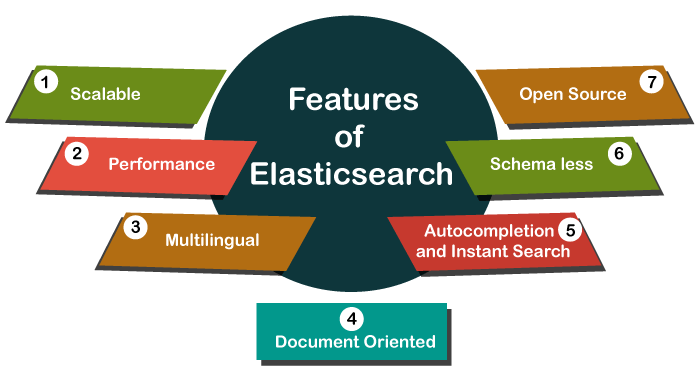Advantages and disadvantage of ElasticsearchElasticsearch is a distributed document-oriented search engine, which is used to store data in the form of a document. It has several advantages as well as some disadvantages too. Below are the following topics of Elasticsearch is discussed in detail: Let's look at some key advantages of using Elasticsearch NoSQL database. Advantages of Elasticsearch
Disadvantages of Elasticsearch
Features of ElasticsearchElasticsearch has various features, which makes it flexible and powerful. A list of Elasticsearch features is given below with a detailed explanation. 
1. ScalableIt can be scalable across multiple nodes. So eventually, you can start with a single node or two or three nodes. If the workload grows, in that case, you scale across multiple nodes. So, the more instances can be added to a cluster whenever needed. It is horizontally scalable. 2. PerformanceIt is very fast comparatively other search engines. It executes operations on data very fast. 3. MultilingualElasticsearch is a multilingual means it is available in various languages. So, the people of different regions can use it in their languages. 4. Document OrientedElasticsearch is document-oriented, which does not use schemas and tables to store data. It stores all the data in a document form. Therefore, whatever document is created, the data is presented in the form of JSON format, which is a widely accepted web format. So, you can integrate several solutions as it provides you the output in terms of JSON format. 5. Autocompletion and Instant SearchIt supports auto-completion and instant search. So, whenever you start typing queries, it automatically does support the auto-completion. It automatically provides suggestions to complete queries. 6. Schema lessIt is schema-less because it follows the document-oriented approach instead of schemas and tables. So, the data is stored in documents in Elasticsearch. 7. Open SourceIt is an open-source search database search engine. So, anyone can download it without paying any license cost.
Next TopicKey concepts of Elasticsearch
|
 For Videos Join Our Youtube Channel: Join Now
For Videos Join Our Youtube Channel: Join Now
Feedback
- Send your Feedback to [email protected]
Help Others, Please Share










